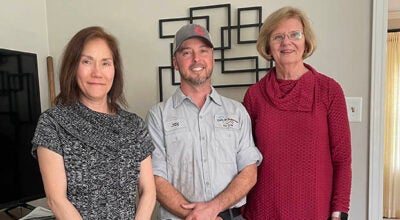Is everything tickety-boo?
Published 7:36 am Thursday, July 19, 2018
It wasn’t too long ago that PBS broadcast a wonderful show from the BBC called “My Mother and other strangers.” The main character, a strongwilled English woman living in WWII Ireland, at one point in the show asks her daughter “is everything tickety-boo?”
I had to look that up. It sounded so catchy and yet mysterious. Turns out it means “is everything in order or correct?” We would say “is everything OK?” The origin of this British phrase is most likely Hindi and first appeared in writing in 1939.
With Season 5 of the Great British Baking Show (GBBS) now underway on PBS, this column is dedicated to some of the delightful, quirky and unexpected words and phrases that form part of British English.
In an earlier season of the GBBS one of the contestants remarked that he was gobsmacked by the difficulties he encountered in the showstopper (the final and most challenging round of each episode) and later said that he was chuffed to have been chosen star baker. Gobsmacked means “surprised or astonished” while chuffed means “very pleased.”
According to the Oxford English Dictionary (OED) gob is most likely Irish in origin and means mouth. Before that gob meant the beak of a bird although this use has passed on from the language. Other compounds that incorporate gob are gobmouthed ‘open mouthed’ and gobstrings ‘horse’s bridle.’ Chuffed meaning “pleased” first appeared in 1957 and is military slang. Interestingly, chuffed can also mean “displeased or disgruntled.”
In the early 19th century chuff was used dialectally (not in standard British English) to mean “a cheek swollen or puffed out with fat” although this use is now obsolete.
As for food words often heard on the GBBS British English one occasionally hears self-raising flour or raising agent where we would use the word rising. Also used are treacle “a type of sweet syrup”, biscuits “cookies” and Victoria sponge for a double layer yellow cake with raspberry jam and whipped cream between the layers.
When it comes to leafy greens and other edible plants, it is not uncommon to hear veg instead of vegetable which one buys at the green grocer.
While I haven’t heard these on the show, other attention-grabbing examples of British English include boffin for expert, bloke for guy, carriageway for highway, sticky wicket for a tough situation and bobby for policeman.
Be sure to catch some of the current season of GBBS and as Minisha, one of the contestants this season on the GBBC said as she slid her golden fruit tart “pie” onto a platter, Bob’s your uncle “there you go.”
JULIA PALMER can be reached at jpalmer@hsc.edu.




